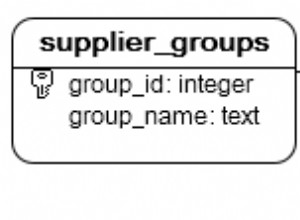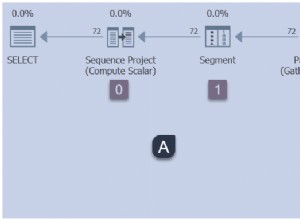Ich schlage meine Lösung in einem Pull-Request vor
Die Idee ist, die Entität zu ändern in:
import com.example.demo.pojo.SamplePojo
import com.vladmihalcea.hibernate.type.json.JsonBinaryType
import com.vladmihalcea.hibernate.type.json.JsonStringType
import org.hibernate.annotations.Type
import org.hibernate.annotations.TypeDef
import org.hibernate.annotations.TypeDefs
import javax.persistence.*
@Entity
@Table(name = "tests")
@TypeDefs(
TypeDef(name = "json", typeClass = JsonStringType::class),
TypeDef(name = "jsonb", typeClass = JsonBinaryType::class)
)
data class SampleEntity (
@Id @GeneratedValue
val id: Long?,
val name: String?,
@Type(type = "jsonb")
@Column(columnDefinition = "jsonb")
var data: Map<String, Any>?
) {
/**
* Dependently on use-case this can be done differently:
* https://stackoverflow.com/questions/37873995/how-to-create-empty-constructor-for-data-class-in-kotlin-android
*/
constructor(): this(null, null, null)
}
- Jede Entität sollte entweder einen Standardkonstruktor oder Standardwerte für alle ihre Parameter haben
- Anstatt POJO zu speichern, speichern Sie als
Map<String, Any>eingeben
Da wir die vollständige Kontrolle darüber haben, was in POJO in der Geschäftslogik enthalten sein wird, besteht das einzige fehlende Stück darin, POJO in Map und Map in POJO umzuwandeln
SamplePojo-Implementierung
data class SamplePojo(
val payload: String,
val flag: Boolean
) {
constructor(map: Map<String, Any>) : this(map["payload"] as String, map["flag"] as Boolean)
fun toMap() : Map<String, Any> {
return mapOf("payload" to payload, "flag" to flag)
}
}
Dies ist eher ein Workaround, aber es erlaubt uns, mit beliebigen Tiefenstrukturen zu arbeiten.
P.S. Mir ist aufgefallen, dass Sie Serializer verwenden und equals, toString, hashCode neu definiert . Sie brauchen dies nicht, wenn Sie data class verwenden .
AKTUALISIERUNG:
Wenn Sie eine flexiblere Struktur als Map<String, Any> benötigen , können Sie JsonNode verwenden . Codebeispiel
Entität:
import com.fasterxml.jackson.databind.JsonNode
import com.vladmihalcea.hibernate.type.json.JsonBinaryType
import com.vladmihalcea.hibernate.type.json.JsonStringType
import org.hibernate.annotations.Type
import org.hibernate.annotations.TypeDef
import org.hibernate.annotations.TypeDefs
import javax.persistence.*
@Entity
@Table(name = "tests")
@TypeDefs(
TypeDef(name = "json", typeClass = JsonStringType::class),
TypeDef(name = "jsonb", typeClass = JsonBinaryType::class)
)
data class SampleJsonNodeEntity (
@Id @GeneratedValue
val id: Long?,
val name: String?,
@Type(type = "jsonb")
@Column(columnDefinition = "jsonb")
var data: JsonNode?
) {
/**
* Dependently on use-case this can be done differently:
* https://stackoverflow.com/questions/37873995/how-to-create-empty-constructor-for-data-class-in-kotlin-android
*/
constructor(): this(null, null, null)
}
Entität im Repository ändern:
import com.example.demo.entity.SampleJsonNodeEntity
import org.springframework.data.jpa.repository.JpaRepository
interface SampleJsonNodeRepository: JpaRepository<SampleJsonNodeEntity, Long> {
}
Tests für beide Ansätze:
import com.example.demo.DbTestInitializer
import com.example.demo.entity.SampleJsonNodeEntity
import com.example.demo.entity.SampleMapEntity
import com.example.demo.pojo.SamplePojo
import com.fasterxml.jackson.module.kotlin.jacksonObjectMapper
import junit.framework.Assert.assertEquals
import junit.framework.Assert.assertNotNull
import org.junit.Before
import org.junit.Test
import org.junit.runner.RunWith
import org.springframework.beans.factory.annotation.Autowired
import org.springframework.boot.test.autoconfigure.jdbc.AutoConfigureTestDatabase
import org.springframework.boot.test.context.SpringBootTest
import org.springframework.test.context.ContextConfiguration
import org.springframework.test.context.junit4.SpringRunner
@RunWith(SpringRunner::class)
@SpringBootTest
@ContextConfiguration(initializers = [DbTestInitializer::class])
@AutoConfigureTestDatabase(replace = AutoConfigureTestDatabase.Replace.NONE)
class SampleRepositoryTest {
@Autowired
lateinit var sampleMapRepository: SampleMapRepository
@Autowired
lateinit var sampleJsonNodeRepository: SampleJsonNodeRepository
lateinit var dto: SamplePojo
lateinit var mapEntity: SampleMapEntity
lateinit var jsonNodeEntity: SampleJsonNodeEntity
@Before
fun setUp() {
dto = SamplePojo("Test", true)
mapEntity = SampleMapEntity(null,
"POJO1",
dto.toMap()
)
jsonNodeEntity = SampleJsonNodeEntity(null,
"POJO2",
jacksonObjectMapper().valueToTree(dto)
)
}
@Test
fun createMapPojo() {
val id = sampleMapRepository.save(mapEntity).id!!
assertNotNull(sampleMapRepository.getOne(id))
assertEquals(sampleMapRepository.getOne(id).data?.let { SamplePojo(it) }, dto)
}
@Test
fun createJsonNodePojo() {
val id = sampleJsonNodeRepository.save(jsonNodeEntity).id!!
assertNotNull(sampleJsonNodeRepository.getOne(id))
assertEquals(jacksonObjectMapper().treeToValue(sampleJsonNodeRepository.getOne(id).data, SamplePojo::class.java), dto)
}
}




